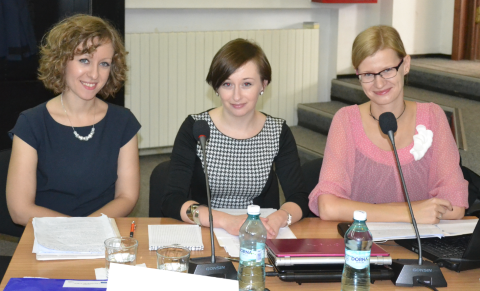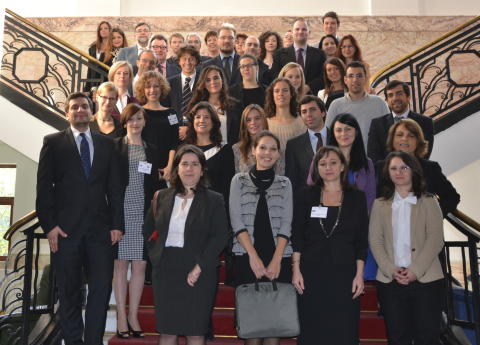- Team Poland wins the 2013 THEMIS competition!
- Team France as runner-up and Team Italy in third place.
- 8 teams representing 6 different nationalities participated in the competition.
Congratulations to team Poland, the winners of the 2013 THEMIS competition! Ms Marta Choromańska, Ms Aleksandra Bolibok, Ms Maura Bruska and team coach Mrs Barbara Augustyniak won the honour for the team’s outstanding performance at the THEMIS finals held in Bucharest in autumn 2013.

Team Poland!
In all, eight teams representing France, Italy, Poland, Portugal, Romania and Scotland participated in the finals. While the calibre of all teams was exceptional, the competition’s jurors announced the best three teams:
- Winners: Poland
- Runner-up: France
- Third: Italy
Creative way of thinking
As with all THEMIS grand final championships, each team worked hard during the week-long event to prepare a written paper, rehearse their presentation and ultimately take part in a head-to-head debate with an opposing team.
The Polish team’s written paper, oral presentation and subsequent debate proved to be the winning formula. Given the exceptional performance of the team, did they have an inkling that they had won the competition? The team explained that they felt quite positive, and that they had identified three of their favourite teams, but that they didn’t really know who would win in the end.
During the awards ceremony on the last day of the competition, the jury provided observations about all of the teams’ performances, which proved to be invaluable for the Polish team.
“The feedback from the jury about our creative way of thinking was valuable and really nice to hear. It was so concrete and the underlined issues in it were particularly helpful to us,” explained the team. They went on to say that such feedback “is extremely important as it will have such a good contribution to developing our skills.”
Revealing some of the vital ingredients of success, the Polish team suggested any would-be THEMIS teams “be more confident and relaxed. Don’t be afraid to make your own opinion known. This system is another way of thinking.”
The Polish team’s coach, Augustyniak, shed a bit of light on the special, nurturing role a THEMIS team coach has. “I was almost like a mother to them. My main role at first was to believe in the team. The team really was so well prepared, smart and modest.” She reiterated how proud she was of her team, and said that the other teams had put on strong performances as well.
Embracing it
EJTN’s annual THEMIS competition continues to grow rapidly and attract teams from all across Europe. As yet another illustration of its growing reach, THEMIS 2013 attracted its first team from Scotland.
Team Scotland was certainly enthusiastic about the benefits of participating. “This THEMIS competition definitely developed our knowledge of both EU and human rights law. It made us enthusiastic about interacting with our colleagues. It also pushed us to work hard,” explained the team.
The team also had a bit of advice for future THEMIS participants. “Be very prepared and ready for difficult questions. Embrace it and learn as much as you can from it. It’s a competition, but it’s also a learning experience,” reflected the team.
Pride and joy
The superb host of THEMIS 2013 was Romania’s National Institute of Magistracy (NIM), a founding organisation of THEMIS. The Institute’s director, Mrs. Octavia Spineanu-Matei, reflected on the significance of staging the competition yet again.
“Hosting the Grand Final of the 2013 THEMIS Competition in Bucharest has been a reason for pride and joy and, at the same time, a challenge. A reason of pride because this privilege is granted to the country and EJTN member whose team won the Grand Final of the previous edition. A reason of joy because we had the opportunity to once again meet old friends and partners from EJTN, but also to get to know new people: members of the jury, trainers and judicial trainees.”
“A challenge because to organise such a wide-ranging event implied providing – for a whole week – facilities such as 9 seminar rooms, the auditorium, the necessary technical equipment, Wi-Fi access etc… and, last but not least, the full and enthusiastic support of our Initial Training Department members.
She also mentioned the many other arrangements NIM made for the competition. The Initial Training Programme of the 200 auditors of justice had to be relocated for one week to other extra-curricular activities. Also organised were the many social events such as the welcome dinner, the city walking tour, the awards ceremony and the farewell cocktail and banquet – which, according to all present, was splendid!
Spineanu-Matei beamed that “despite all the efforts and emotions we have experienced during the THEMIS week, we would be happy to host again the Grand Final as soon as possible!”
Many thanks
EJTN thanks the five jury members, Dr Wolfgang Heusel of Germany, Mr Irmantas Jarukaitis of Lithuania, Mr Meelis Eerik of Estonia, Ms Hermine Masmeyer of The Netherlands and Ms Kristina Čahojová of Slovakia for all of their efforts during the competition.
EJTN also wishes to thank Romania’s National Institute of Magistracy (NIM), a founding organisation of THEMIS, and in particular its director, Spineanu-Matei, for hosting the THEMIS finals and for the exceptionally warm welcome and the outstanding practical arrangements.
In honour of the winners, the THEMIS 2014 grand finals will be held in autumn 2014 in Krakow, Poland.
EJTN is grateful for the generous financial support of the European Commission. As the proud organiser of the annual THEMIS competition, EJTN is confident that this long-running event aimed for future magistrates will help bolster a lasting common European space of justice.
 The THEMIS 2013 family photo
The THEMIS 2013 family photo
About THEMIS
The main aim of the THEMIS project is to bring together future magistrates from different European countries at a time when they are undergoing entry level training to enable them to share common values and to exchange new experiences and discuss new perspectives in areas of common interest.
The project also aims to develop abilities related to the future profession of the participants, such as communication skills, debating abilities, critical and analytical thinking, logical reasoning and proper legal writing. Furthermore, THEMIS is intended to foster the development of professional contacts, experiences and relationships between both the entry-level trainees in magistracy and their teaching staff.